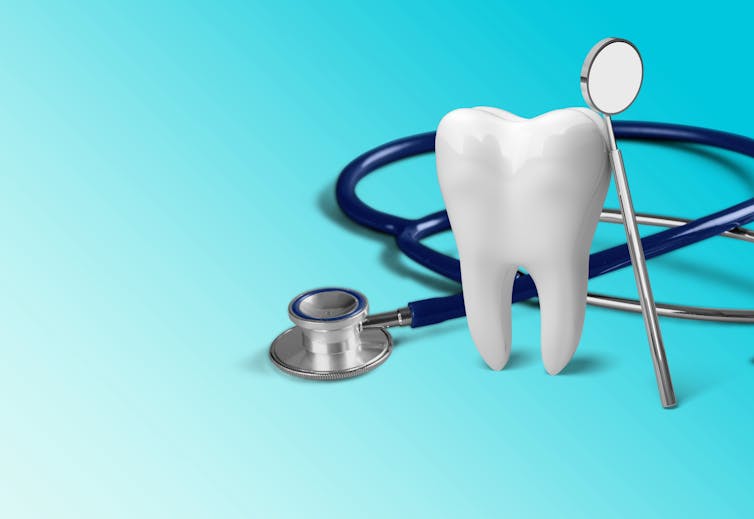
Noha A. Gomaa, Western University
Oral diseases, particularly dental decay and periodontal (gum) diseases, are largely preventable, yet are some of the most common non-communicable diseases around the world. Pain due to untreated dental decay impacts eating and sleep quality, among other essential functions. Indeed, the agonizing nature of dental pain earned it the title of “the hell of all diseases” more than 200 years ago.
But pain is only the most obvious of the many ways oral health is linked to overall health.
Access to dental care
The federal government recently launched the long-anticipated Canada Dental Care Plan (CDCP) to improve access to dental care for the almost nine million Canadians who lack dental insurance.
The program comes in light of the increasing barriers to dental care with the most recent data from Statistics Canada showing that one in four Canadians avoid seeing a dental professional due to costs. While this burden affects mostly low-income families, seniors and people living with disabilities, it also places a huge toll on the population as a whole.
On top of the time lost from school or work due to dental problems, many without the means to access dental care end up seeking care in hospital emergency departments, unnecessarily costing the health-care system billions of dollars.
The CDCP is an important milestone that could eventually get many Canadians the dental care they need and deserve. Meanwhile, this investment in oral health is a reminder of the importance of a healthy mouth, what makes it fundamental to overall health, and notably, how the potential impact of improving access to dental care for those who need it most may extend beyond the mouth.
Oral health is integral for overall health
The World Health Organization (WHO) defines oral health as “the state of the mouth, teeth and orofacial structures that enables individuals to perform essential functions such as eating, breathing and speaking, and encompassing psychosocial dimensions such as self-confidence, well-being, and the ability to socialize and work without pain, discomfort and embarrassment.”
A healthy, disease-free mouth is key to quality of life and well-being. Being fundamental to various essential functions, the lack of oral health connects it to a number of chronic diseases in several ways.
The most recent WHO report shows that dental decay and gum diseases affect almost 25 per cent of Canadian adults — a higher figure than that observed in the United States. Importantly, both conditions are among the most common causes of tooth loss in adults globally, thereby impacting the ability to eat, the quality of nutrition and, in seniors, contributing to frailty and declining cognitive health.
Severe gum disease in particular is an inflammatory condition that is linked to several other chronic conditions through exacerbating inflammatory reactions in other organs and body systems and that may arguably contribute to some heart and kidney diseases, among others.
Importantly, there is a bidirectional relationship between gum diseases and diabetes, where severe inflammation of the gums and supporting bone can aggravate the risk and complications of diabetes, and vice versa.
The consequences of an unhealthy mouth also extend to an individual’s social interactions. For example, those experiencing poor esthetics due to crooked, broken or stained teeth are more likely to be stigmatized and blamed for their dental appearance. In severe cases, they may potentially have fewer opportunities for employment.
Observations such as these bring to mind the 19th century’s French naturalist and father of paleontology, Georges Cuvier who famously said, “Show me your teeth and I will tell you who you are.”
Cuvier’s statement at the time intended to describe how teeth where distinctive of populations according to diets and environmental impacts. Nevertheless, it is not hard to see its relevance to the appearance and health of the mouth and teeth and their impact on how one is perceived in today’s society.
Children’s health and dental care

Certainly, oral diseases affect all age groups and children are no exception. Recent reports show that almost 39 per cent of Canadian children under nine years old have dental decay. Just like in adults, the impact of dental decay on children extends to poor nutrition, and affects sleep and development.
For example, Canadian kindergarteners in need of dental treatment were found to score lower on physical, cognitive, social and emotional development scales than those without dental problems. On top of this, researchers found the treatment of severely decayed teeth to be by far the most common reason for children aged one to five years old to receive general anesthesia to undergo surgery.
Dental care and chronic conditions
The connection between oral health and overall health is evident in myriad ways, and so is the need to improve oral health and access to dental care in Canada. It also raises the question of whether dental care can help alleviate chronic conditions beyond the mouth.
The scientific evidence on that varies, and largely depends on the chronic condition in question. For example, patients with diabetes are among those who can benefit the most from having better access to dental care. Treating gum diseases can help subside body inflammation and reduce the risk and complications of diabetes by helping the body regulate blood glucose levels.
Notably, Canada ranks fourth out of 29 countries in the Region of the Americas in its rate of lip and oral cavity cancer. Many dentists are trained to spot the signs of oral cancer and can help in its early detection, which can be lifesaving.
As we learn more on the impact of dental treatment on chronic disease management, we know that facilitating access to dental care can have promising results on several fronts. In addition to saving costs for individuals and our health-care system, it would enhance the population’s oral health and potentially help in the management of some chronic diseases, such as diabetes.
Importantly, it can reduce the pervasive and inequitable burden of oral diseases.
Indeed, investing in better access to dental care may bring us closer to a healthy smile and beyond, for every Canadian.![]()
Noha A. Gomaa, Assistant Professor, Dental Public Health and Oral Medicine, Schulich School of Medicine & Dentistry, Western University
This article is republished from The Conversation under a Creative Commons license. Read the original article.


